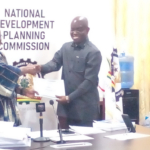
Dr. Nii Moi Thompson, Chairman of the National Development Planning Commission (NDPC), has warned that ministries and state institutions without validated Medium-Term Development Plans (MTDPs) will not receive budgetary allocations.
This move aims to ensure alignment with government policy objectives, promote fiscal discipline, and strengthen institutional accountability.
The Ministries, Departments, and Agencies (MDAs) must, therefore, present their MTDPs for 2026 to 2029 to the NDPC for validation and certification to access budgetary allocations.
Dr Nii Moi Thompson announced this during the presentation of certificates of approval of the Medium-Term Development Plans of some MDAs and Regional Coordinating Councils in Accra.
He noted that the plans and the budget were inseparable because they provided guidance to government’s resource allocations and ensured coherent and harmonious development of programmes and projects across the country.
This requirement is backed by the 1992 Constitution (Articles 86 and 87), National Development Systems Regulations 2016 (L.I 2232), National Development Planning System Act, 1994 (Act 480), and Public Financial Management Act, 2016 (Act 921).
The Ministry of Finance and the NDPC have developed guidelines for preparing the 2026-2029 Medium-Term Development Plans, which would be implemented starting January 2026, covering 261 districts and 16 regions.
The move promotes fiscal discipline and ensures that state entities’ development plans align with government policy objectives.
The requirement for validated MTDPs aims to strengthen institutions and enhance their development planning capabilities.
Dr Audrey Smock-Amoah, Acting Director-General, NDPC, in her welcome remarks, said the Commission received the development plans of 18 out of 38 MDAs, four out of 16 regional coordinating councils, and 64 out of 261 metropolitan, municipal and district assemblies.
The plans were prepared based on site development dimensions, economic, social, environmental, infrastructural and spatial planning as well as governance and international relations policy objectives.
The NDPC thus subjected the development plans to rigorous review of the draft documents through situational analysis, multiple consultations and introspection of the current national development policy objectives, Dr Smock-Amoah explained.
Some of the MDAs and RCCs that had their MTDP certified and approved by the NDPC were Ministries of Finance, Lands and Natural Resources, Attorney General and Ministry of Justice and Gender, Children and Social Protection.
The rest were Trade, Agribusiness and Industry, Works, Housing and Water Resources, Local Government, Chieftaincy and Religious Affairs, as well as the Greater Accra and Eastern Regional Coordinating Councils, and the National Development Planning Commission.
Dr Smock-Amoah indicated that the certification and approval of the plans were not an end in themselves but should work towards achieving tangible results by creating jobs for the teeming youth and ensuring economic prosperity for all Ghanaians.